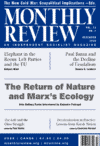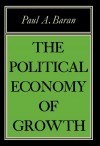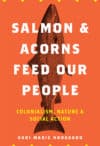
December 2020 (Volume 72, Number 7)
The United States is now in a New Cold War with Russia and China, with the focus increasingly on the latter and involving a direct challenge to U.S. hegemony over the world economy. | more…

The United States is now in a New Cold War with Russia and China, with the focus increasingly on the latter and involving a direct challenge to U.S. hegemony over the world economy. | more…

In an interview with Alejandro Pedregal, John Bellamy Foster tells us about the paths great ecosocialist thinkers traveled, the most prominent debates in current Marxist ecological thought, and the urgent need for a project that transcends the conditions that threaten the existence of our planet today. | more…
European left parties have, over the last couple of decades, become increasingly critical of political developments in the European Union, particularly as a response to the austerity policies that followed the financial crisis of 2007–08 and the subsequent euro crisis. These were accompanied by high and sustained unemployment and promises of a social pillar that never materialized. Nevertheless, even if criticism of the European Union has sharpened, this has not been well reflected in the political strategies of the left. | more…

Recently published and estimated historical data illustrate that economic surplus declined during the thirteenth and fourteenth centuries in England, helping explain the “crisis of feudalism” that started in the thirteenth century. It was not until several centuries later, when capitalism became the dominant economic system, that the economic surplus began to rise on a consistent basis, due to the reinvestment of a portion of the surplus into productive activities, a greater ratio of capital income to rental income, and a greater ratio of investment to economic surplus. | more…

Fundamental to Kari Marie Norgaard’s Salmon and Acorns Feed Our People is the seizure of land most evident in the overtly violent era of state-sanctioned frontier genocide and forced relocation of the Karuk. Settler colonialism, Norgaard reminds us, is an ongoing state-led project up to this day—it is not just a moment relegated to the past and, thus, the inherent treatment of Native Americans as relics of U.S. history must be challenged. | more…

Both Toni Gilpin’s The Long Deep Grudge and Michael Goldfield’s The Southern Key offer ample evidence that the grand era of U.S. labor history scholarship is not yet past. The Long Deep Grudge is in equal parts labor history and family reminiscence as Gilpin seeks the fuller story of her father, who played a leadership role in the United Auto Workers union. The Southern Key is in many ways a study of a different variety, but very much of a similarly militant kind. Goldfield, a labor activist veteran himself, draws the big picture of what he sees as the central failure of the U.S. left: the failure to organize the South. | more…
Notifications